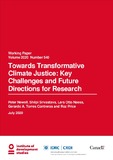Towards Transformative Climate Justice: Key Challenges and Future Directions for Research
| dc.contributor.author | Newell, Peter | |
| dc.contributor.author | Srivastava, Shilpi | |
| dc.contributor.author | Naess, Lars Otto | |
| dc.contributor.author | Torres Contreras, Gerado A. | |
| dc.contributor.author | Price, Roz | |
| dc.date.accessioned | 2020-07-03T15:26:56Z | |
| dc.date.available | 2020-07-03T15:26:56Z | |
| dc.date.issued | 2020-07-03 | |
| dc.identifier.citation | Newell, P.; Srivastava, S.; Naess, L.O.; Torres Contreras, G.A. and Price, R. (2020) Towards Transformative Climate Justice: Key Challenges and Future Directions for Research, IDS Working Paper 540, Brighton: Institute of Development Studies | en |
| dc.identifier.isbn | 978-1-78118-664-0 | |
| dc.identifier.issn | 2040-0209 | |
| dc.identifier.uri | https://opendocs.ids.ac.uk/opendocs/handle/20.500.12413/15497 | |
| dc.description.abstract | From forest fires in Australia and California to record floods in Jakarta and the UK, it is clear that no area of the world is immune from the effects of climate change. Many countries and cities have woken up to this fact and have declared climate emergencies. We have witnessed unprecedented social mobilisation around the issue, including the school strikes and the rise of direct-action movements such as the Extinction Rebellion. Mainstream discourses are increasingly framed around the recognition that climate change is fundamentally a question of justice, in terms of the responsibility for the problem and its mitigation; that vulnerabilities to the impacts of climate change are both a reflection of, and exacerbate, structural injustices; and that there will be residual impacts beyond the capacity to mitigate and adapt or what might be deemed ‘tolerable’ impacts. Climate justice is understood in a multitude of ways and reflects the fact that the causes and effects of climate change, as well as efforts to tackle it, raise ethical, equity and rights issues. The language of climate justice is increasingly omnipresent in the discourse of academia, civil society, social movements, some governments, cities and even some businesses. But the mechanisms for delivering it are weak and under-developed. This paper shows that definitions of what is covered by climate justice, at what scales, how it can be measured, and which are the best means to deliver it are all heavily contested. These differences in the understanding of climate justice matter because they have serious implications for those countries, regions and communities on the front line of the impacts of climate change and are increasingly apparent in efforts to accelerate decarbonisation. Given the closing window for effective responses to avoid the worst effects of climate change, we have to work with the institutions, policy processes, and economies we currently have to secure the best outcomes possible, while simultaneously advocating for and building alternatives that address deeper structural concerns. Towards this end, we suggest that transformative climate justice is a useful concept to focus attention on the need to disrupt power relations and shift decision-making processes which lock in and reproduce climate injustices. | en |
| dc.description.sponsorship | International Development Research Centre | en |
| dc.language.iso | en | en |
| dc.publisher | Institute of Development Studies | en |
| dc.relation.ispartofseries | IDS Working Paper;540 | |
| dc.rights | This is an Open Access paper distributed under the terms of the Creative Commons Attribution Non Commercial 4.0 International licence (CC BY-NC), which permits use, distribution and reproduction in any medium, provided the original authors and source are credited, any modifications or adaptations are indicated, and the work is not used for commercial purposes. | en |
| dc.rights.uri | http://creativecommons.org/licenses/by-nc/4.0/ | en |
| dc.subject | Climate Change | en |
| dc.subject | Environment | en |
| dc.subject | Governance | en |
| dc.title | Towards Transformative Climate Justice: Key Challenges and Future Directions for Research | en |
| dc.type | IDS Working Paper | en |
| dc.rights.holder | Institute of Development Studies | en |
| dc.identifier.team | Resource Politics | en |
| rioxxterms.funder | Default funder | en |
| rioxxterms.identifier.project | Default project | en |
| rioxxterms.version | VoR | en |
| rioxxterms.funder.project | 9ce4e4dc-26e9-4d78-96e9-15e4dcac0642 | en |
Files in this item
This item appears in the following Collection(s)
-
IDS Research [1671]
Except where otherwise noted, this item's license is described as This is an Open Access paper distributed under the terms of the Creative Commons Attribution Non Commercial 4.0 International licence (CC BY-NC), which permits use, distribution and reproduction in any medium, provided the original authors and source are credited, any modifications or adaptations are indicated, and the work is not used for commercial purposes.


